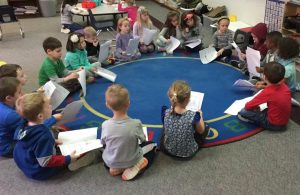Let’s Talk about Talking

A view from the author’s classroom.
At my school, we have found that by working on oral language confidence, we can help lower-elementary students build up their reading and writing skills. When students are comfortable speaking in front of others, they start to feel more comfortable trying new things or taking risks to build reading and writing skills.
Below are some ways I have incorporated oral language skills into my classroom.
Student of the Week
Each week, one student is chosen to be student of the week. Students have to bring in a poster board decorated with pictures of themselves, family, things they like, and so forth. They present it to the class and talk about each picture.
That week they also bring in a toy and read a book to the class. After each activity, the other students are encouraged to ask questions of the student or share connections.
These activities give the presenters an opportunity to build oral language and presentation skills, in a fun, non-threatening way, since they know a lot about the topic and they choose what they are sharing. It also helps the audience learn to ask questions and practice sharing in front of a group.
Writers Workshop
At the beginning of the year, “writing” lessons focus on oral stories with picture illustrations. The students learn about stories’ components, without focusing on the stressful act of writing. When they have a more solid foundation of letter writing and sound skills, we move into the act of writing.
Most my writing lessons still start with students’ orally telling a friend what they are going to write about–before going off to work. This helps the students completely formulate the thought they want to write about.
Flipgrid

An app, Flipgrid, allows students to record videos about “how to” writing.
Another idea I recently tried, inspired by an app discussed in this blog post, was to have students present one of our writing assignments using Flipgrid.
My latest writing unit was on “How To” writing. I had the students choose something they wanted to teach someone to do. Then they drew an illustration of each step. Using the illustrations, they each created a video in Flipgrid.
My students were so proud of themselves and loved doing it. And though we could use some video-skills practice, we’ll get there! I am excited to find what other lessons will easily lend themselves to using the app, and I know my kinders are too.
Work Activity Time–AKA Free Choice
I briefly touched on the power of play in a post last year. Play is such an important part of the day, not only because of the creativity that students are allowed to demonstrate, but because of the conversations, problem solving, and pretending they engage in.
In February our school participated for the second time in Global School Play Day (mark your calendars for the fourth annual event, on February 8, 2018). This is a day dedicated globally to promoting the positive aspects of play. On this day, our upper elementary teachers shared how students that never speak out in class were really getting into the games they brought in. The student groups mixed together and brought out shared interests, as they had conversations while playing a game. This was a site to see! Students became more comfortable with their classmates, and in turn more comfortable speaking out in classroom discussions.
Bringing It Home
This year I have been sending home a “choice board” to parents instead of “homework.” It has things on it like, “Write thank you notes for holiday gifts,” “Jump up and down counting by 10s,” and “Read a nonfiction book.” I also added things like, “Go for a walk and talk about the signs of winter you see,” or “Talk about the different animals you see and what you know about them.”
All together, these activities build students’ speaking skills. And in doing so, they help lay the important foundations for students’ reading and writing skills. To get students talking–it’s something we as teachers should keep talking about.
 Tricia Ziegler (Twitter: @axf96; blog: http://kindergartentreasures.blogspot.com) is a kindergarten teacher at Loon Lake Elementary, in the Walled Lake School District. She is a part of the Walled Lake iCouncil (Instructional Council) team and is part of starting a coding club at her school this year. She is in her eleventh year of teaching, with nine in kindergarten and two in Second Grade. Prior to that she taught in the Walled Lake Great Start Readiness Program, which is a state-funded preschool program for at-risk students. Tricia attended Michigan State University for her undergraduate degree and specialization in Early Childhood. She then attended Wayne State University for her Master’s in Teacher Education.
Tricia Ziegler (Twitter: @axf96; blog: http://kindergartentreasures.blogspot.com) is a kindergarten teacher at Loon Lake Elementary, in the Walled Lake School District. She is a part of the Walled Lake iCouncil (Instructional Council) team and is part of starting a coding club at her school this year. She is in her eleventh year of teaching, with nine in kindergarten and two in Second Grade. Prior to that she taught in the Walled Lake Great Start Readiness Program, which is a state-funded preschool program for at-risk students. Tricia attended Michigan State University for her undergraduate degree and specialization in Early Childhood. She then attended Wayne State University for her Master’s in Teacher Education.
